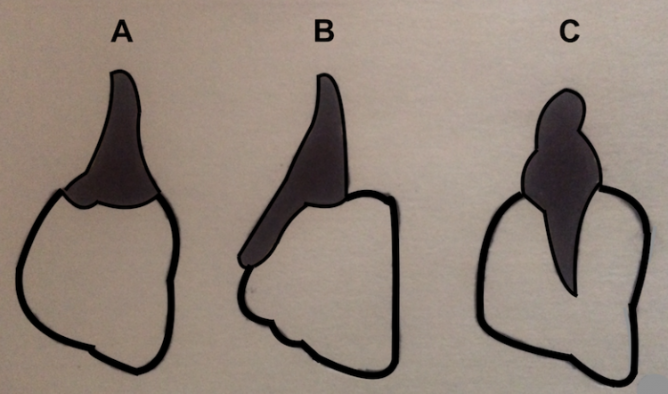Midterm #2 Review
1/37
There's no tags or description
Looks like no tags are added yet.
Name | Mastery | Learn | Test | Matching | Spaced |
|---|
No study sessions yet.
38 Terms
Health problems generally arise due to proper _____ .
husbandry
Ecdysis is _____ . Dysecdysis is _____ and can be the result of low _____ and poor _____ .
shedding of skin
failure/inability to shed skin
humidity
nutrition
TRUE OR FALSE
The skin of lizards are very permeable, meaning spray products will easily absorb into the skin
FALSE
lizard skin is generally impermeable except for their mucous membranes
Chromatophores are found on _____ and _____ . They are influenced by _____ conditions and not _____ . However, _____ can also change color due to _____ .
chameleons and anoles
environmental
color
green iguanas
age, stress, breeding, or illness
TRUE OR FALSE
Like snakes and turtles, lizards also lack a sternum.
FALSE
Lizards have a sternum that is cartilaginous.

A - acrodont: no sockets, teeth not replaced when lost, found in chameleons)
B - pleurodont: sockets, replaced through life, found in iguanas and monitor lizards)
C - thecodont: teeth in socket, found in dinosaurs)
Old world chameleons have _____ feet.
zygodactylous
TRUE OR FALSE
Lizards, snakes, and turtles lack a diaphragm
TRUE
Herbivorous lizards have a _____ tongue.
Carnivorous lizards have a _____ tongue.
fleshy
snake-like
Lizards, snakes, and turtles have a _____ , meaning that blood flows from the _____ portion of the body and can go directly to the _____ before returning to the _____ . This is why it is important to avoid nephrotoxic drugs in the _____ half of the body.
renal portal system
caudal
kidneys
heart
caudal
Define
oviparous
viviparous
ovoviviparous
oviparous - egg laying, little or no embryonic development within the mother
viviparous - live birth, young have developed inside the mother’s body
ovoviviparous - embryos develop inside eggs and remain in the mother’s body until ready to hatch
TRUE OR FALSE
Lizards have no apparent withdrawal reflex from heat
TRUE
What is the Jacobson’s organ?
sensory organ that collects scent particles on the tongue and transfers them to sensory cells
_____ light is is necessary for vitamin ___ synthesis, which affects _____ absorption. Lack of this light can lead to ___ .
UVB
D
calcium
MBD
The calcium to phosphorous ratio in lizards should be ___ or ___ for life.
1:1
1:2
TRUE OR FALSE
Iguanas are strictly vegetarian, unable to adapt to other diets as pets.
FALSE
Iguanas are readily adaptable, able to eat cat/dog food, insects, fish, etc…
_____ lizards are the most popular pet lizards today.
insectivorous
Define the optimal foraging theory.
Animals choose prey by evaluating cost vs gain, larger food items over multiple food items, and sometimes by only eating certain foods even when other options are present
TRUE OR FALSE
Carnivorous lizards generally have more nutritional deficiencies than herbivorous or insectivorous ones.
FALSE
Carnivorous lizards generally have LESS nutritional deficiencies than herbivorous or insectivorous ones.
_____ is the top behavior disorder in lizards. Every species can _____ . Anything over ___ feet should be considered dangerous.
aggression
bite
3
Salmonella is transmitted via the _____ and does not require _____ contact.
fecal-oral route
direct
How do you stimulate the vagal response?
gently put pressure over both eyes for a few seconds/minutes to cause the heart rate and blood pressure to decrease
What is the preferred venipuncture method for lizards and where is it located?
ventral tail vein
TRUE OR FALSE
Snakes can be found on every continent.
FALSE
Snakes can be found on every continent EXCEPT Antarctica
What are the largest and smallest snake species?
reticulated python
Barbados thread snake
In snakes, the _____ pivots to allow the rotation of the jaw.
quadrate bone
What are the four types of locomotion found in snakes and which is the most common?
concertina
lateral undulation (most common)
sidewinding
rectilinear
Lizards, snakes, and turtles have a ___ chambered heart.
3
In snakes, diurnal species have a _____ pupil while nocturnal species have _____ pupil.
round
vertical slit
___% of snakes are _____ .
70%
oviparous
TRUE OR FALSE
Most snakes are carnivorous.
FALSE
ALL snakes are carnivorous
TRUE OR FALSE
When feeding a snake, prey should only be as large as the largest part of the snake’s body.
TRUE
What type of stitch is used to close the snake’s skin during surgery and why?
everted
snake skin naturally heals in an inverted manner
TRUE OR FALSE
Turtles are considered the most primitive group of living reptiles.
TRUE
_____ turtles are generally considered the most labor intensive reptiles to maintain.
aquatic
TRUE OR FALSE
Anesthetic induction in reptiles is easy.
FALSE
Induction is difficult because they can hold their breath
In turtles, what is the most common reason for veterinary treatment?
Which is the most common reproductive problem?
Which is most common in California desert tortoise?
respiratory disease (pneumonia)
dystocia
urolithalisis (bladder stone)
What is the most difficult part of euthanizing a turtle and where should the injection site be?
the hardest part is knowing whether or not the turtle is dead
intracoelomic